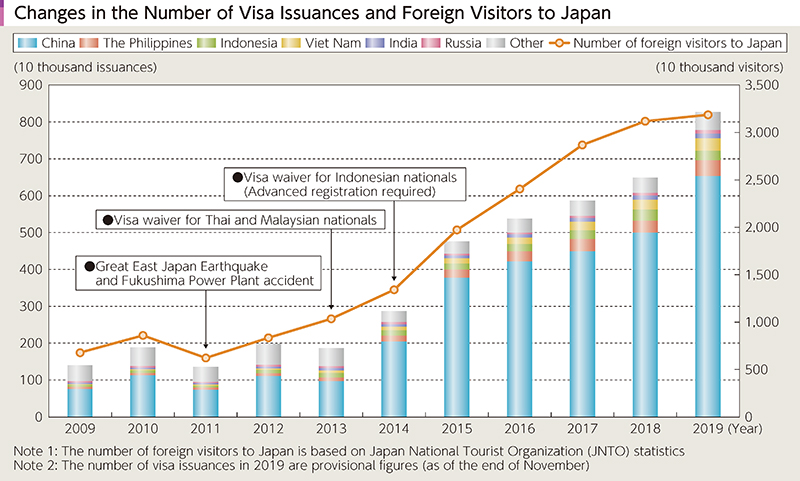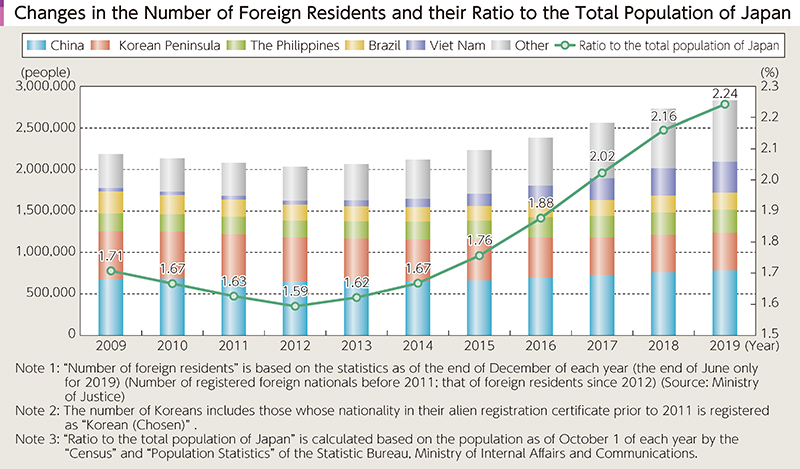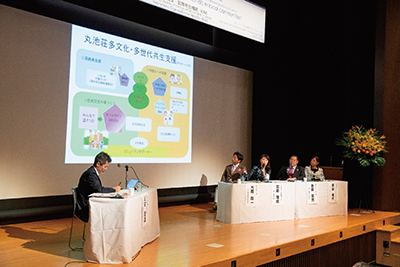Diplomatic Bluebook 2020
Chapter 4
Japan's Diplomacy Open to the Public
Section 1 Japanese Society and People Deepening Their Ties with the World
1 Linking the Vibrancy of Foreign Nationals to the Growth of Japan
(1) Growth Strategy and Relaxation of Visa Requirements
In 2019, the number of foreign visitors to Japan reached the highest on record at 31.88 million. The Government of Japan set new goals for the number of foreign visitors to 40 million in 2020 and 60 million in 2030 in the “Tourism Vision to Support the Future of Japan” issued in March 2016. In the vision, it is stated that the Government will engage in strategic relaxation of visa requirements for the five countries that require a visa to visit Japan (China, Russia, India, the Philippines, and Viet Nam) out of 20 countries and regions that have high market potential to attract tourists. Based on it, in 2019, MOFA implemented a relaxation of visa requirements from the perspective of promoting people-to-people exchanges, strengthening bilateral relations, etc. In this regard, specific measures were taken as follows: the simplification of documentation requirements and the expansion of eligible persons for multiple entry visas for Indian nationals, the relaxation of visas for Chinese nationals, the introduction of multiple entry visas for individuals who have a Hong Kong DI1 (equivalent to a passport) or a Macao Travel Permit, and relaxation of multiple entry visas for Saint Christopher and Nevis nationals on January 1; the introduction of multiple entry visas for Colombian nationals on February 1; the relaxation of multiple entry visas for Qatari nationals on April 1; the relaxation of multiple entry visas for Lao nationals on August 1; and the relaxation of visas for Russian nationals on September 1. In addition, Japan started a working holiday program with Lithuania.
As described above, further expansion of the relaxation of visa requirements is expected as it is effective for promoting people-to-people exchanges and Japan's economic growth. On the other hand, the Government intensifies visa control as a part of border control measures to prevent the entry of criminals and foreign visitors with the intention of being illegal labor, as well as those who could become victims of human trafficking. MOFA will keep working on the relaxation of visa requirements in order to increase the number of foreign visitors to Japan while maintaining “Japan as the safest country in the world,” and to contribute to making Japan a tourism-oriented country both in quality and quantity through attracting the wealthy class, repeat visitors, and the young generation. In addition, MOFA intends to conduct such relaxation of visa requirements, taking into account bilateral relations, their diplomatic significance, and other factors in a comprehensive manner, while considering their balance with border control measures.
- 1 Document of Identity for Visa Purposes

(2) Acceptance of Foreign Nationals and Their Social Integration
Since the financial crisis in 2008, the number of long-term foreign residents in Japan had kept decreasing until 2012 when the trend turned upward. While the aging of the population continues with a low birth rate resulting in the decrease of the population, it is important for Japan to secure capable human resources, in Japan or from abroad, in order to further vitalize Japan's economy and improve its competitiveness. In December 2018, the Immigration Control and Refugee Recognition Act was revised, and Japan started taking in foreign human resources2 by way of introducing the status of residence “Specified Skilled Worker” in April 2019. It is expected that the number of competent foreign nationals living in Japan will further increase in the future.

MOFA cooperates with the relevant ministries and agencies on such policies taking into account foreign nationals' human rights. As part of that, it hosts the “International Forum on Acceptance of Foreign Nationals and Their Integration into Japan,” aiming to encourage debate among the people by providing opportunities to discuss concrete challenges and measures. In October, MOFA co-hosted a forum with the International Organization for Migration (IOM) under the theme of “Smooth Acceptance of Foreign Nationals in Local Communities,” and panelists discussed good ways to smoothly accept foreign nationals.
 International Forum on Acceptance of Foreign Nationals and Their Integration into Japan (October 31, Tokyo)
International Forum on Acceptance of Foreign Nationals and Their Integration into Japan (October 31, Tokyo)In July, MOFA and the Tokyo Metropolitan Government co-hosted the Disaster Management Seminar for Diplomatic Missions and Foreign Delegations in Tokyo in order to facilitate and reinforce information communication systems in times of disaster as well as collaboration with diplomatic missions and foreign delegations in Tokyo.
- 2 In 2019, Memoranda of Cooperation (MOC) were signed with the following countries regarding the basic framework for proper implementation of a system for foreign national human resources having the “Specified Skilled Worker” residence status: the Philippines, Nepal, Cambodia, Myanmar, Mongolia, Sri Lanka, Indonesia, Viet Nam, Bangladesh, Uzbekistan, Pakistan.
